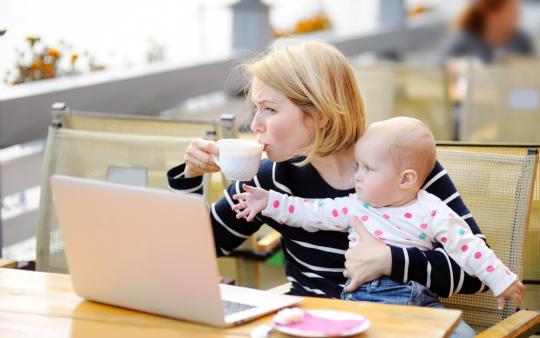Coffee and new parents often go hand in hand.
And although a good cup of Joe is a common pleasure for many moms and dads, especially ones living off little sleep, it can quickly turn into an unhealthy habit. Usually it's the parents affected most but in some cases it can also be unhealthy for babies.
How does coffee affect our bodies?
Caffeine is a stimulant. It reaches our brains quickly, therefore making us more alert and awake. And that’s exactly why parents love it. The amount of caffeine we can tolerate without unpleasant side effects is different for everyone. Your tolerance level is affected by your age, body mass, and any health conditions you may have. Not only does caffeine raise the amount of acid in our tummies, causing uncomfortable symptoms such as heartburn and gassiness, in large amounts it can also interfere with our absorption and metabolism of certain important minerals. For many people, too much caffeine can also create insomnia, nervousness, restlessness, irritability, fast heartbeat, and muscle tremors.
Caffeine and breastfeeding
Caffeine is also a diuretic. And that means it can dehydrate you, especially if you’re breastfeeding. Breastfeeding requires a huge amount of fluids. It’s important to stay extra hydrated and drinking more coffee than water is a big no no. It will completely deplete you. You might also have a hard time taking a nap when you most need it.
“If you're burning the candle at both ends (as many moms do) and begin to rely on coffee to get you through your day, you run the risk of over stressing the body and perhaps facing health issues like burnout or adrenal fatigue,” said Kathleen Neilson, a mother of two and registered nutritional consultant and lactation student. “Remember not to use coffee as a crutch or coping mechanism. Sometimes we need to slow down, put our feet up or take a nap with our baby.”
How caffeine affects your baby
According to Neilson, a very small amount (usually less than 1%) of caffeine transfers through breast milk and caffeine levels usually peak in milk about one to two hours after consumption.
“Many nursing moms fear they will have to give up their morning coffee or tea, which can be a daunting thought with all those sleepless nights,” she said. “Most breastfeeding mothers can drink caffeine in moderation with no adverse effects on baby.”
Up to five 5oz cups of drip coffee per day (or 500 mg) is considered to be safe.
So coffee isn’t really all that bad for babies? Well, not quite. Something worth considering is how long caffeine kicks around in a baby's system. According to the La Leche League Canada, the half-life, which means the time required for the concentration of a substance in the body to decrease by half, of caffeine is about 97.5 hours in a newborn, 14 hours in a 3 to 5 month old baby and 2.6 hours in a baby older than six months. Because it takes longer to clear out of a baby, it may cause more irritability and wakefulness which can mean more crazy tired times for the parents. “Some babies may be sensitive to caffeine as well, particularly those whose mother consumed little or no caffeine during pregnancy,” Neilson added. These babies too will be more wakeful, restless or irritable.
Keeping your coffee in check
Newborns don't typically sleep well which often leads to overcompensation with coffee for parents. Don’t get trapped in that vicious cycle, warns Neilson. When asked if she’s much of a big coffee drinker herself, she said she actually drinks less now. “I usually limit myself to two cups of coffee in the morning. After that, if I need a pick me up I have an energy-rich snack to get me through.” Keeping hydrated and maintaining a balanced diet is important. “I think it's important for everyone to remember that coffee is OK in moderation but not in excess,” Neilson said. And no, coffee shouldn’t be considered a replacement for breakfast.






